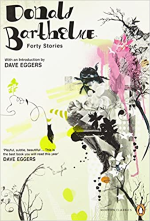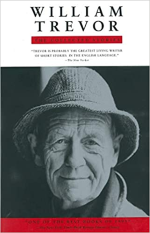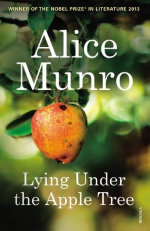Lost in the Stacks/Short Stories2
Published on 30th June 2020
 Welcome to the thirteenth entry of our blog series 'Lost in the Stacks' - with recommendations by Dublin City Libraries staff. This one was submitted by Brian from the Relief Panel/Home Delivery Service for Cocooners. In his introduction to Donald Barthelme’s ˈSixty Storiesˈ, David Gates reports that Barthelme once described the typical short story as being ‘constructed mousetrap-like to supply, at the finish, a tiny insight typically having to do with innocence violated’.
Welcome to the thirteenth entry of our blog series 'Lost in the Stacks' - with recommendations by Dublin City Libraries staff. This one was submitted by Brian from the Relief Panel/Home Delivery Service for Cocooners. In his introduction to Donald Barthelme’s ˈSixty Storiesˈ, David Gates reports that Barthelme once described the typical short story as being ‘constructed mousetrap-like to supply, at the finish, a tiny insight typically having to do with innocence violated’.
 I feel my gobsmackedness at the twist in many stories I have so enjoyed being mocked by this comment but maybe having written the most audaciously brilliant and hilarious short story ever - ˈSome Of Us Had Been Threatening Our Friend Colbyˈ (from ˈForty Storiesˈ) – Barthelme could feel entitled to have a pot-shot at whatever and whoever he likes.
I feel my gobsmackedness at the twist in many stories I have so enjoyed being mocked by this comment but maybe having written the most audaciously brilliant and hilarious short story ever - ˈSome Of Us Had Been Threatening Our Friend Colbyˈ (from ˈForty Storiesˈ) – Barthelme could feel entitled to have a pot-shot at whatever and whoever he likes.
 This gets me thinking about what (along with an insightful twist ?!!) makes for a good short story and as soon as I do this I’m sorry I started. On re-reading ˈThe Penthouse Apartmentˈ, my favourite story by William Trevor, I note a twist of sorts triumphally heralded by the line ‘“You had trouble with the pipes,” said Mr Morgan’. The said Morgan is a hammy storyteller when compared to the deft and subtle Trevor. We realise, in retrospect, that a throw-away early comment – ‘…animals, within reason, were permitted’ – contains such portent. Truth eludes Miss Winton’s ‘…great mound of words…’. Her reasonableness, with the rally cry ‘“I am trying to promote understanding”’ is dashed on the twin rocks of Morgan’s resentment and the Runcas’ philosophy ‘…that efficiency and a stern outlook were good weapons in the business of accumulating wealth’. This little ˈslice of lifeˈ contains a microcosm of societal strata and stresses but perhaps more striking and Trevoresque is the start-to-finish, slow-burn ˈsinister of the ordinaryˈ (also funny, in the drollest and darkest senses of course). A special ingredient of this is Trevor’s purveyance of drunken conversation, entwining and descending into nonsense but perhaps more scary for its retention of some sense. For me with William Trevor to adore the writing is to adore the man.
This gets me thinking about what (along with an insightful twist ?!!) makes for a good short story and as soon as I do this I’m sorry I started. On re-reading ˈThe Penthouse Apartmentˈ, my favourite story by William Trevor, I note a twist of sorts triumphally heralded by the line ‘“You had trouble with the pipes,” said Mr Morgan’. The said Morgan is a hammy storyteller when compared to the deft and subtle Trevor. We realise, in retrospect, that a throw-away early comment – ‘…animals, within reason, were permitted’ – contains such portent. Truth eludes Miss Winton’s ‘…great mound of words…’. Her reasonableness, with the rally cry ‘“I am trying to promote understanding”’ is dashed on the twin rocks of Morgan’s resentment and the Runcas’ philosophy ‘…that efficiency and a stern outlook were good weapons in the business of accumulating wealth’. This little ˈslice of lifeˈ contains a microcosm of societal strata and stresses but perhaps more striking and Trevoresque is the start-to-finish, slow-burn ˈsinister of the ordinaryˈ (also funny, in the drollest and darkest senses of course). A special ingredient of this is Trevor’s purveyance of drunken conversation, entwining and descending into nonsense but perhaps more scary for its retention of some sense. For me with William Trevor to adore the writing is to adore the man.
 On re-reading ˈThe Love Of A Good Womanˈ, my favourite story by Alice Munro, let’s agree for starters to forget about twists. This story is about strange goings-on in a town called Walley (ok, I’m out of my depth here). It is perhaps more ˈslices of lifeˈ than ˈslice of lifeˈ and yet the slices are linked and more to the point it has that element of encapsulation essential to a short story, albeit a long one. We begin with an elegiac depiction of a vanishing world where each role is precisely, unambiguously and unsparingly delineated, typified by the following:- ‘Most members of that company were between nine and twelve years old, too old to be bound by yards and neighborhoods but too young to have jobs – even jobs sweeping the sidewalk in front of stores or delivering groceries by bicycle’. How from here do we descend (down we go again) incrementally into a miasma of ambivalence? Go figure why Enid gives up her nurse’s training and still ends up nursing. Then consider the likes of the following:- ‘Lies…could be waiting around in the corners of a person’s mind, hanging like bats in the corners, waiting to take advantage of any kind of darkness. You can never say, Nobody could make that up. Look how elaborate dreams are, layer over layer in them, so that the part you can remember and put into words is just the bit you can scratch off the top’. And as Munroesque as ambivalence, behold that most intangible and terrifying of feminine qualities – emotional intelligence. This story is divided into four sections, each one sub-titled for the readers’ convenience. The first is my favourite, where Munro uncannily inhabits the hearts and minds of a trio of boys in the aforementioned 9 to 12-yr-old bracket, but in truth this whole story is a miracle of the uncanny. In the extremely unlikely event that, at this late stage of my efforts, I attain adulthood, perhaps I might even earn the right to bathe fully in the balming (if roiling) waters of Alice Munro’s stories.
On re-reading ˈThe Love Of A Good Womanˈ, my favourite story by Alice Munro, let’s agree for starters to forget about twists. This story is about strange goings-on in a town called Walley (ok, I’m out of my depth here). It is perhaps more ˈslices of lifeˈ than ˈslice of lifeˈ and yet the slices are linked and more to the point it has that element of encapsulation essential to a short story, albeit a long one. We begin with an elegiac depiction of a vanishing world where each role is precisely, unambiguously and unsparingly delineated, typified by the following:- ‘Most members of that company were between nine and twelve years old, too old to be bound by yards and neighborhoods but too young to have jobs – even jobs sweeping the sidewalk in front of stores or delivering groceries by bicycle’. How from here do we descend (down we go again) incrementally into a miasma of ambivalence? Go figure why Enid gives up her nurse’s training and still ends up nursing. Then consider the likes of the following:- ‘Lies…could be waiting around in the corners of a person’s mind, hanging like bats in the corners, waiting to take advantage of any kind of darkness. You can never say, Nobody could make that up. Look how elaborate dreams are, layer over layer in them, so that the part you can remember and put into words is just the bit you can scratch off the top’. And as Munroesque as ambivalence, behold that most intangible and terrifying of feminine qualities – emotional intelligence. This story is divided into four sections, each one sub-titled for the readers’ convenience. The first is my favourite, where Munro uncannily inhabits the hearts and minds of a trio of boys in the aforementioned 9 to 12-yr-old bracket, but in truth this whole story is a miracle of the uncanny. In the extremely unlikely event that, at this late stage of my efforts, I attain adulthood, perhaps I might even earn the right to bathe fully in the balming (if roiling) waters of Alice Munro’s stories.